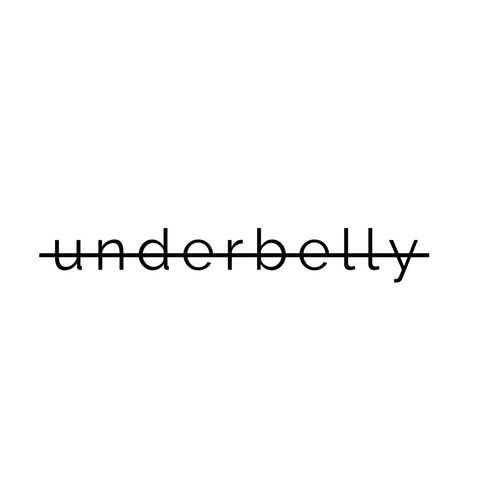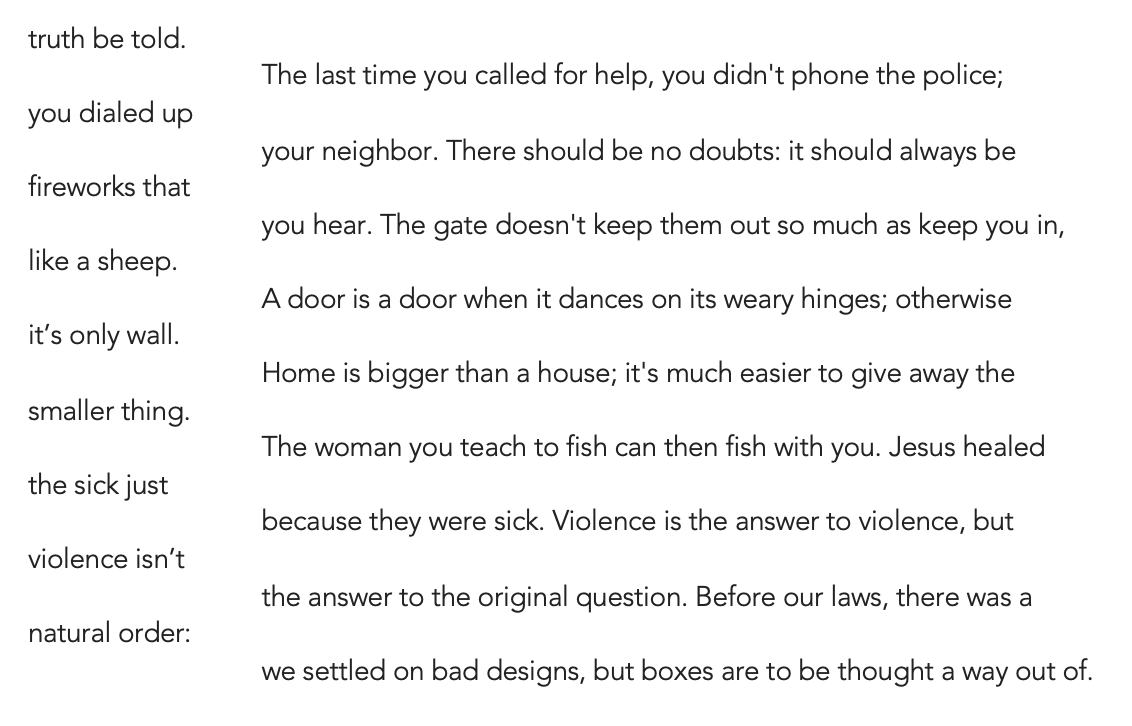Cortney Lamar Charleston
Prior to writing the first draft, I had been trying to wrap my mind around the essentiality of imagination in resistance and revolution. When we live under violent, oppressive systems, one of the principal goals of their design is to make it impossible for us to believe anything other can exist or function in their place: we are actively stripped of imagination to advantage those at the top of the proverbial pyramid (hence “a lack of imagination will kill you”). In playing with this idea, I thought back to my college days, where one of my professors had built his class around the idea that creativity (imagination by another name) emerges underneath constraint. I liked that concept because it suggests that the solution is a matter of reversal rather than a need to bring something original into being. That’s vital, valuable given the suppression of imagination for longer than any of us have been living.
I’m unsure how long this poem was living inside me before I got it out. Looking at time stamps on my computer, it was November 19, 2020, thirteen days after Biden had been declared president-elect, which offered many, if only briefly, a chance to finally catch their breath. After all, we’d been trying to survive COVID-19 since February, and hundreds of thousands of us, at that point, had not. The world had watched George Floyd’s murder and taken to the streets despite the risks to health and body. Folks were furloughed or laid off as businesses and public life shuttered. This poem was birthed, then, by dread. It poured out of me, in its first version, like cheap boxed wine.
Drafting this poem mirrored my typical process: I allowed the language to flow mostly without interruption, with no concern for lineation, barely even a thought to punctuation. I let the words coalesce as they arrived and then I “shaped” the poem later, like clay. A title is an entryway into the poem for a reader, but a title is often the entryway into writing for me, as was the case in this instance, introducing tension from the beginning that the lines to follow unravel.
Once I placed the last period, I realized the text was too rigid and came too close to making a limiting mistake (in my opinion) for a poem: that it operates as the answer rather than the question. Stated differently, it stifled room for the kind of thinking it wants to invite. It was heavy when it needed to be light.
How to get there was unclear to me for some time. I had at least one other draft between these two that was entirely new language, but still suffered the same initial issue. But after a clean separation, I returned to the idea of reversal and revisited the original draft, which did have moments of cleverness or insight; I took several of those moments and challenged myself to think of a way to flip the convention it references, what our systems would program us to lean into as impulse. Isolating them in this exercise was the breakthrough I needed. It made image more of a focus, simplified the language, and squeezed the lines. It opened space. Perhaps most importantly, it led me to strip “you” from the title—which encouraged, however subtly, an individualist focus oppositional to the questions around concern, care, and collective in the spaces between the lines.
I don’t know if this is the “final” version; I just know that it’s brought me further along a necessary journey. For that, I’m grateful and content.
< draft >
IT'S IMPORTANT I REMEMBER THAT A LACK OF IMAGINATION WILL KILL YOU―
I mean, it's obvious they were boxing us in from the beginning,
asked us what we wanted to become one day―
besides ball players―and we boys said firefighter or police officer,
our menu impoverished, though it's worth noting none of us
grew up to say fuck the fire department.
The girls had a better grasp of things but
they were girls, so nobody seemed to care all that much.
The world as introduced to us was small, small-minded
and stubborn, and it remains that way:
we build everything against malleability.
But, ironically, conservatism doesn't give way to conservationism.
Incremental change means the bullet missed my head by inches
instead of taking me out like it did that man with all the dreams.
The point of it all is to make you expend your energy
on understanding things as they operate instead of asking how
they can operate differently: it was the latter that allowed
Daniel Hale Williams to perform the first open-heart surgery.
The issue is that nobody has the time to study
health insurance policies except the people making a profit
off of them, people who don't actually have hearts.
All that time it would take I put into my paycheck instead.
My boss, who is your boss, who is every boss, tells me
to think outside the box whenever something goes off the rails.
The box is singular so we're all inside it at the same time,
thus the expression life is a gift. With Amazon Prime,
all my packages arrive within two days of placing the order
and I think of that as a gift, too.
I believe it's called compartmentalization when you put a box
inside another box. We put God in the box of a church,
put home in the box of a house, put knowledge in the box of a school.
I learned to think in a box and I am not alone in this experience.
Once, one of my professors told me that creativity was being
able to solve a problem within a certain set of constraints:
it was a marketing class but it made a valid point.
We have a two-party system and a whole lot of problems here:
solve for x or put x's in your eyes. If it's not one thing that gets you,
it will be another until, that is, we manifest a destiny where
our words rise to their definitions like snow-white avians.


